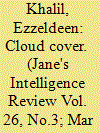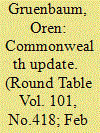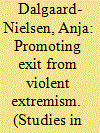| Srl | Item |
| 1 |
ID:
129602


|
|
|
| 2 |
ID:
111173


|
|
|
|
|
| Publication |
2012.
|
| Summary/Abstract |
Militant Islamists terrorised Nigeria, killing hundreds in indiscriminate attacks. The Bangladesh army said it had foiled a coup attempt, while in Pakistan the army seemed closer to launching a coup itself. New Zealand's leader won a second term, Jamaica and Guyana elected new ones, but rival prime ministers vied for power in Papua New Guinea. Fiji lifted martial law. South Africa saw a global deal to combat climate change agreed in Durban but the government was criticised for resurrecting apartheid-era controls over the media. A Malaysian judge threw out a sodomy case against the opposition leader Anwar Ibrahim that was widely seen as politically motivated, and the Federated Farmers of New Zealand called for sheep shearing to become an Olympic sport.
|
|
|
|
|
|
|
|
|
|
|
|
|
|
|
|
| 3 |
ID:
129169


|
|
|
| 4 |
ID:
146110


|
|
|
|
|
| Summary/Abstract |
Descriptions of the Allied Democratic Forces (ADF) – a relatively resilient rebel group in the Congo–Uganda borderland – are almost solely focused upon the rebellion's Islamic extremist characteristics. Through looking specifically at the ADF's recruitment practices, this paper seeks to problematise existing accounts of the group's constitution. It discusses how Islamic extremism has had a significant influence on various aspects of ADF recruitment, and therefore helps to explain particular dimensions of the ADF's composition. Nevertheless, this paper demonstrates that focusing on the role of Islamism alone, leaves a large part of the ADF's story untold – such as the important role played by recruitment networks associated with marginalised and militarised ex-combatants, or the populations of disenfranchised youth in the borderlands. Indeed, unresolved political and socio-economic injustices amongst the people of the Rwenzories have been just as significant motivating factors for joining the rebels as have Islamic sources. Thus, this paper argues that the ADF's recruitment practices and constitution cannot be sufficiently analysed without adequate recognition of the rebel group's position within a borderland context.
|
|
|
|
|
|
|
|
|
|
|
|
|
|
|
|
| 5 |
ID:
120431


|
|
|
|
|
| Publication |
2013.
|
| Summary/Abstract |
A number of Western countries are currently adding exit programs targeting militant Islamists to their counterterrorism efforts. Drawing on research into voluntary exit from violent extremism, this article identifies themes and issues that seem to cause doubt, leading to exit. It then provides a perspective on how these natural sources of doubt might best be brought to bear in connection with an exit program by drawing on social psychology and research into persuasion and attitude change. It is argued that an external intervention should stay close to the potential exiter's own doubt, make the influence attempt as subtle as possible, use narratives and self-affirmatory strategies to reduce resistance to persuasion, and consider the possibility to promote attitudinal change via behavioral change as an alternative to seek to influence beliefs directly.
|
|
|
|
|
|
|
|
|
|
|
|
|
|
|
|